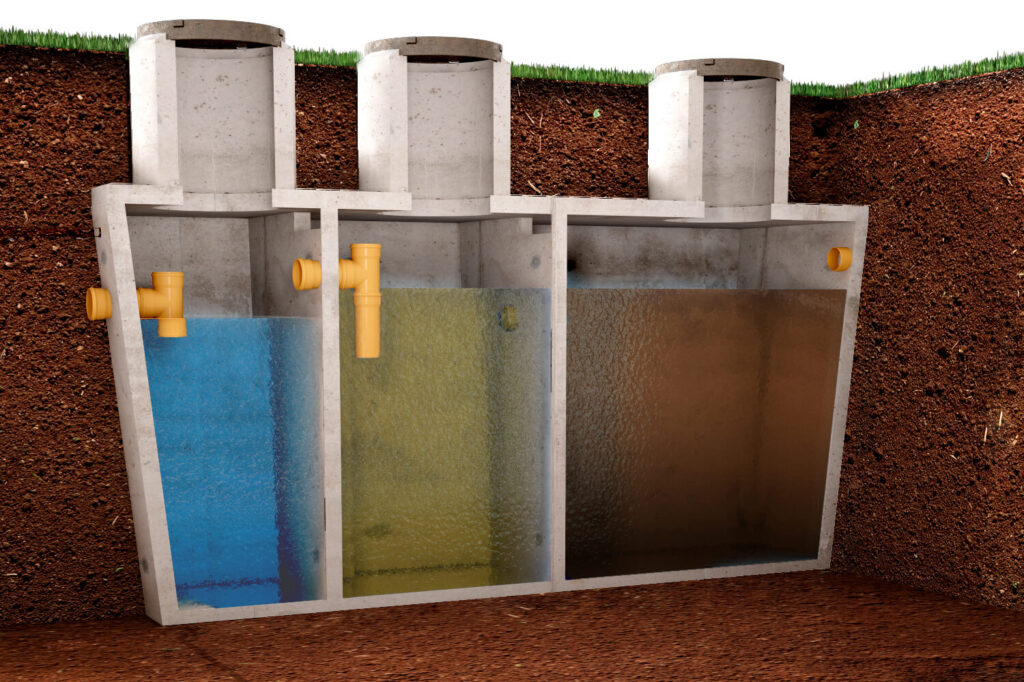Septic tanks are a crucial part of home waste management systems, but not every house has one. This article explores which types of homes are equipped with septic tanks, the factors influencing their presence, and the alternatives used in areas without septic systems.
What Are Septic Tanks?
A septic tank is an underground chamber made of concrete, fiberglass, or plastic through which domestic wastewater flows for basic treatment. The system works by separating solids from liquids, with bacteria breaking down the organic matter. The remaining wastewater, or effluent, then filters out through a drain field, eventually seeping into the soil where further natural purification takes place.
Septic systems are often used in areas where there is no direct connection to a municipal sewage system. They provide a self-contained waste treatment solution for homes, especially in rural or suburban regions.
Do All Houses Have Septic Tanks?
The simple answer is no—not all houses have septic tanks. The type of waste management system a house uses largely depends on its location and the availability of municipal sewage services.

- Rural and Suburban Areas: Houses in rural or less densely populated suburban areas are more likely to have septic tanks. In these regions, connecting to a municipal sewage system is often impractical or too costly, so septic tanks provide a convenient alternative.
- Urban and City Areas: In contrast, most houses in urban or city areas are connected to a municipal sewage system, which treats wastewater at a centralized facility. These systems are managed by local authorities, and homeowners pay for the service through monthly utility bills.
Factors That Determine Whether a House Has a Septic Tank
Several factors influence whether a house will have a septic tank or be connected to a municipal sewage system:
- Geographic Location: Homes in rural areas, where there is less infrastructure for municipal sewage, are far more likely to have septic tanks. Suburban homes may have septic systems if they are located too far from city sewage networks.
- Availability of Municipal Sewage Systems: If a house is located in a city or town that has a well-established sewage system, it will likely be connected to it. Rural areas often lack this infrastructure, necessitating the use of septic tanks.
- Age of the House: Older homes in rural areas are more likely to have septic tanks, especially if they were built before modern sewage systems became common. However, as municipal sewage systems expand, some older homes may be retrofitted to connect to them.
- Local Regulations and Building Codes: Some regions require homes to be connected to the municipal system if it’s available, while others allow or even require the use of septic systems. Building codes and environmental regulations can vary significantly from one place to another.

Alternatives to Septic Tanks
While septic tanks are commonly used in rural areas, there are several alternatives:
- Municipal Sewage Systems: The most common alternative to septic tanks is a connection to a municipal sewage system. These systems transport wastewater from homes to centralized treatment facilities where it is processed and treated before being released back into the environment.
- Cesspools: Some older homes, particularly in rural areas, may use cesspools. These are similar to septic tanks but lack a drain field, allowing wastewater to seep directly into the ground. Due to environmental concerns, cesspools are being phased out in many areas.
- Eco-friendly Septic Systems: There are also newer, more sustainable alternatives, such as aerobic treatment systems, which use oxygen to break down waste more efficiently, reducing environmental impact.
Comparison Between Septic Tanks and Municipal Sewage Systems
| Aspect | Septic Tanks | Municipal Sewage Systems |
|---|---|---|
| Common in | Rural/Suburban areas | Urban/City areas |
| Maintenance | Requires regular pumping and care | Managed by local authorities |
| Initial Cost | Higher installation cost, lower operational | Lower installation cost, higher utility bills |
| Environmental Impact | Potential risk to soil and groundwater | Centralized treatment, less local impact |
| Responsibility | Homeowner responsible for maintenance | Managed by city or local authorities |
Pros and Cons of Septic Tanks
Septic tanks offer many advantages, particularly for homes in rural or remote locations, but they also come with certain drawbacks:
Pros:
- Independence from Municipal Systems: Homes with septic tanks do not rely on municipal sewage infrastructure, making them self-sufficient.
- No Monthly Sewage Fees: Since homeowners manage their own waste systems, they don’t pay regular sewage fees to the city.
- Suitable for Remote Areas: Septic tanks are ideal for homes where connecting to a city sewage system would be too expensive or logistically challenging.
Cons:
- Regular Maintenance: Septic tanks must be pumped every 3 to 5 years to prevent overflows, and improper maintenance can lead to costly repairs.
- Environmental Risks: Septic systems that are not well-maintained can leak and contaminate groundwater or nearby water bodies, posing health and environmental risks.
- High Upfront Costs: Installing a septic system can be expensive, particularly in areas with poor soil conditions or a high water table.
Advantages and Disadvantages of Septic Tanks
| Advantages | Disadvantages |
|---|---|
| Independence from municipal systems | Regular maintenance and pumping required |
| No monthly sewage fees | Potential for leaks and contamination |
| Suitable for areas without sewage systems | High upfront installation costs |
Conclusion
In summary, not all houses have septic tanks. Whether a home uses a septic system or is connected to a municipal sewage system largely depends on location, availability of infrastructure, and local regulations. Septic tanks offer a self-sufficient waste management solution, particularly for homes in rural areas, while municipal sewage systems are more common in urban settings. Homeowners should be aware of the pros and cons of each system and understand the maintenance requirements to ensure effective waste management and minimize environmental risks.
Understanding whether your home has a septic tank or is connected to a municipal system is essential for proper maintenance and cost management. Whether you have a septic system or rely on a city sewer, both options come with their own set of responsibilities and benefits.
